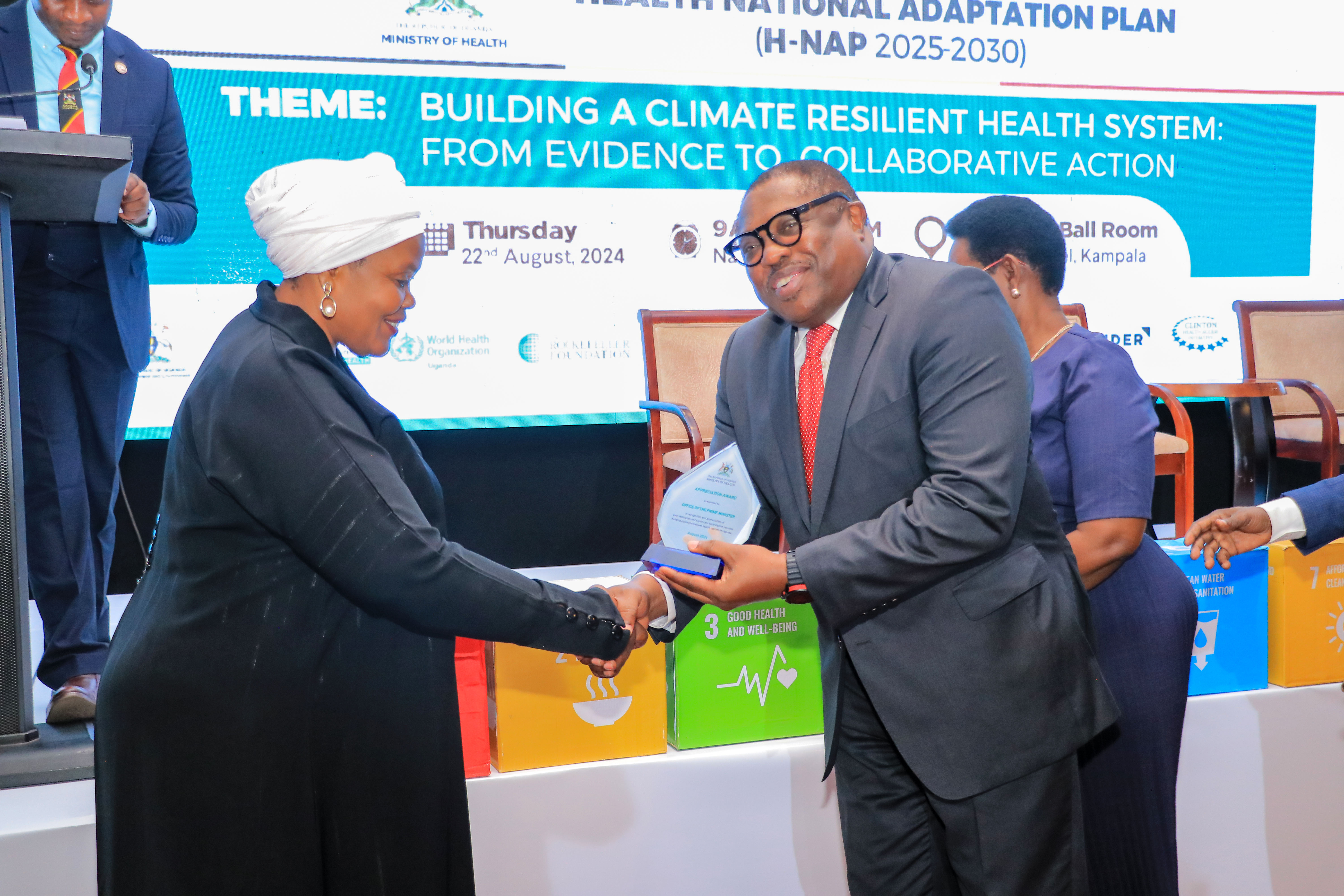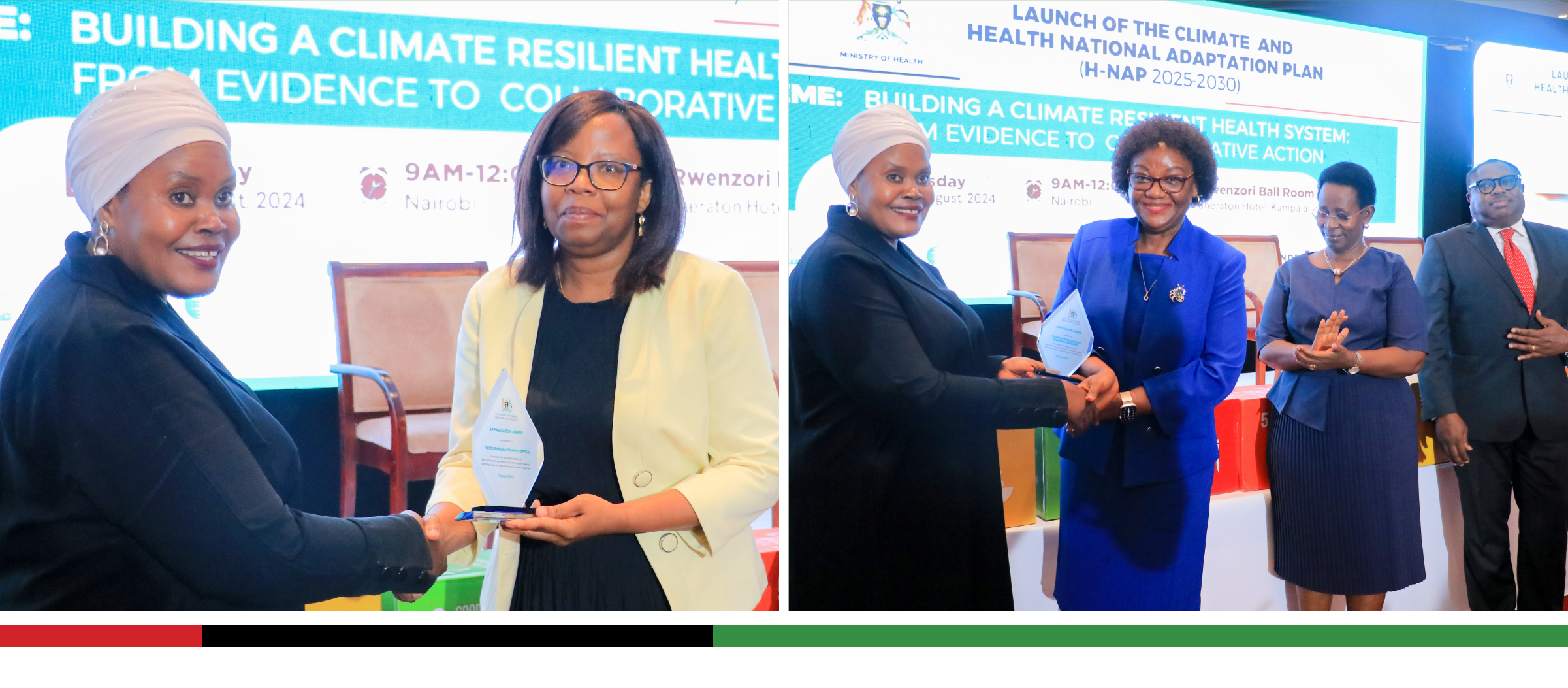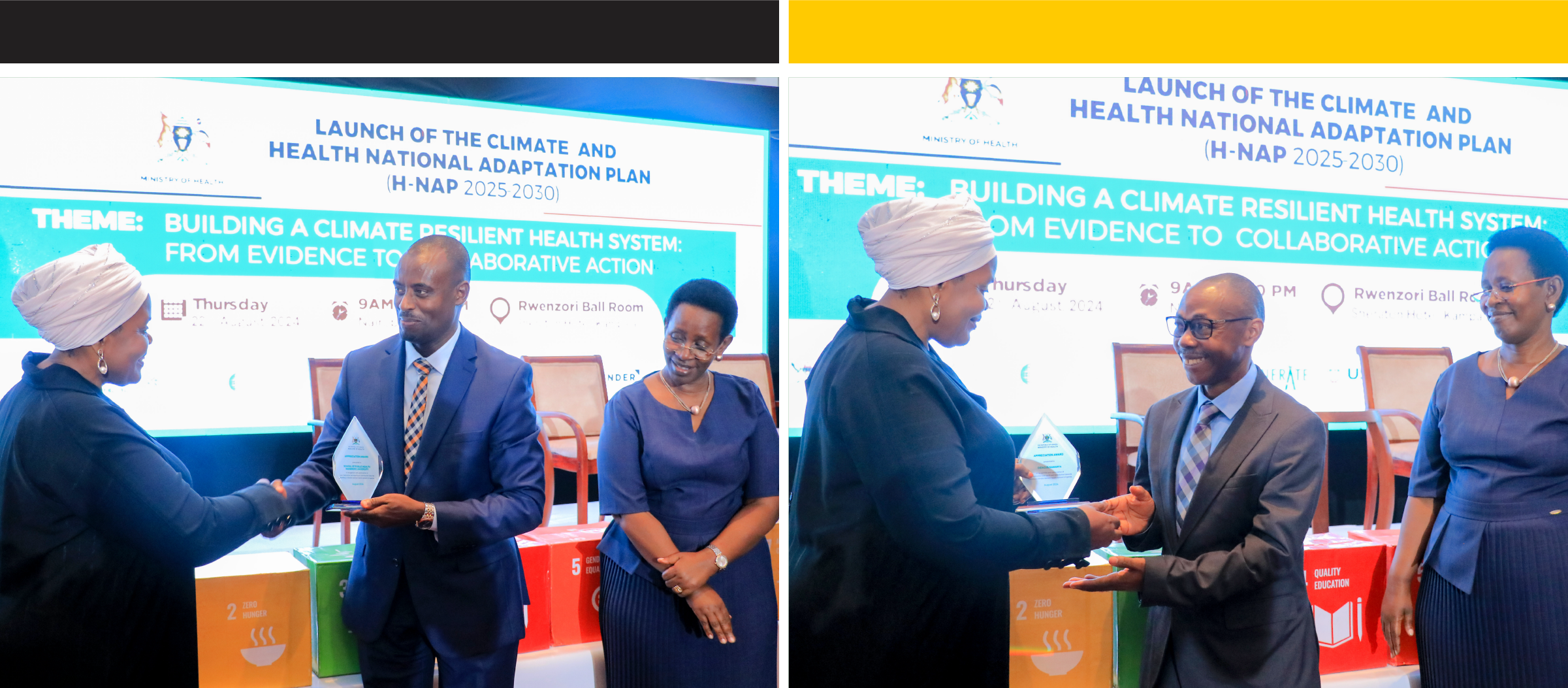
By Davidson Ndyabahika
The Ministry of Health Uganda has recognised 12 outstanding agencies and eight individuals for championing climate change and health resilience in Uganda. They received the 2024 climate and health champions awards.
The awards were presented at the launch of the Climate Change Health National Adaptation Plan -H-NAP, 2025-2030) to address the significant threat climate change poses to public health and enhance the resilience of the health sector against climate-related impacts in the country, by the Rt. Hon. Lukia Isanga Nakadama, the 3rd Deputy Prime Minister of Uganda and the woman Member of Parliament for Mayuge District while presiding over the ceremony as the Chief Guest at Sheraton Hotel, Kampala on Thursday August 22, 2024.
Speaking at the launch of the H-NAP, Dr. Diana Atwine, the Permanent Secretary Ministry of Health noted that climate change is a cross-cutting phenomena and that many institutions and individuals have been engaged in activities that directly or indirectly promote building of a climate resilient health system in Uganda.
The Ministry of Health handed the award to The Rockefeller Foundation, an American private foundation and philanthropic medical research and arts funding organization. The Foundation provided technical and financial support to Uganda to conduct the vulnerability assessments of the health sector and develop the Health National Adaptation Plan. With this funding, Makerere University School of Public Health (MakSPH) was asked to generate evidence through field research whose results were used to develop the H-NAP.
The Foundation was recognized for its technical and financial support towards Uganda’s climate and health response. Mr. William Asiko, Vice President and head of The Rockefeller Foundation’s Africa Regional Office received the award on behalf of The Foundation.
Other organisations that received the awards were the Office of the Prime Minister for its continued support to climate health emergencies. The Ministry of Water and Environment’s Department of Climate Change also received an award in recognition of the collaborative efforts on climate and health policies and governance in the country.
The World Health Organisation (WHO) Uganda country office also was recognized for its technical and financial support. Also, MakSPH received an appreciation award for its contributions to building a climate-resilient system in Uganda for its technical support in developing the H-NAP. Professor Rhoda Wanyenze, the Dean, received the award on behalf of the School.

Regenerate Africa’s Executive Director Mr. Charles Kabiswa, received the Appreciation Award in recognition of Regenerate's technical and financial contribution towards building a climate resilient health system in Uganda. Regenerate Africa is a non-profit organisation that aims to contribute to, and accelerate Africa’s transition to a regenerative economy.
Clinton Health Access Initiative (CHAI), Seed Global Health Uganda, Pathfinder Uganda, Amref Africa, Tree Adoption Uganda and Reproductive Health Uganda equally received awards as a token of appreciation for the advocacy and distinguished support to the health sector.
Individual awards went to the Hon. Dr. Jane Ruth Aceng, Minister of Health as a special recognition for her technical, political leadership towards a climate resilient health system. Other officials recognized in the Ministry include; Dr. Diana Atwine, the Permanent Secretary, Dr. Henry Mwebesa, the Director General, Dr. Danie Kyabayinze, Director Health Services -Public Health, Dr. Herbert Nabaasa, Commissioner Health Services -Environmental Health Department and Dr. Didacus Namanya, a Health Geographer/ Climate Change Focal Person at the Ministry of Health for their technical leadership and advocacy.

Among those awarded was Dr. John Bosco Isunju, a Lecturer and Lead on the Climate Change Vulnerability and Adaptation Assessment (VAA) and H-NAP for his technical support and advocacy.
Uganda’s H-NAP was developed to guide climate change adaptation efforts in the health sector and was informed by the Climate Change Vulnerability and Adaptation Assessment (VAA) conducted in 716 selected health facilities across Uganda.
Climate change is by far the greatest threat to human health. Existing scientific evidence from the intergovernmental Panel on Climate Change (IPCC) Assessment Reports and other sources show that environmental determinants of health such as water, food, air among others have been and will continue to directly and indirectly affected. At the same time, all other components of the health system such as the health infrastructure, health workforce, essential products and supply chains are also being negatively affected by climate change.
Uganda is already experiencing the effects of climate change, which is characterized by floods, and landslides with shorter or longer rains, harsher droughts, and warming up in different parts of the country.
Droughts affect the availability of safe and adequate water supply for domestic consumption, and floods contaminate water with disease causing pollutants, which can result in water-related diseases such as typhoid and cholera.
The vulnerability assessment conducted in 2023 had their results shared at national stakeholder’s validation meetings and at the COP28 in Dubai.
The VAA reported that nearly half (47.6%) of healthcare facilities are vulnerable to drought, while 39.7% face the risk of floods in Uganda. Additionally, 31.1% are exposed to storms, 12.0% are at risk from rising water levels, and 11.7% are susceptible to landslides. Lightning poses a threat to 8.9% of facilities, heat waves affect 2.0%, and cold waves impact 0.1%.
Other findings from the VAA assessment reveals that a significant 76.5% of healthcare facilities in Uganda that are affected by drought reported considerable impacts on their health workforce. Additionally, 73.6% experienced disruptions in water, sanitation, and hygiene (WASH) services, while 32.6% faced challenges related to infrastructure, technologies, products, and processes.
This H-NAP that has been launched covers ten components based on the WHO framework aimed at building a climate resilient low-carbon health system which is capable of anticipating, responding to, coping with, recovering from. and adapting to climate-related shocks and stress, while minimising the greenhouse gas emissions and other negative environmental impacts to deliver quality care and protect the health and well-being of present and future generations of Uganda.
The H-NAP proposes a range of short-term and long-term interventions across ten components: climate- transformative leadership and governance, climate-smart health workforce, integrated risk monitoring, and sustainable financing among others. Specific actions include; developing guidelines for mainstreaming climate and health, training health workers, enhancing disease surveillance systems, and revising infrastructure standards for climate-proofing.
Stakeholders at the H-NAP launch noted that its success relies on strong collaboration between government ministries, health agencies, civil society organizations, and the private sector, ensuring a coordinated and effective response to climate change.

